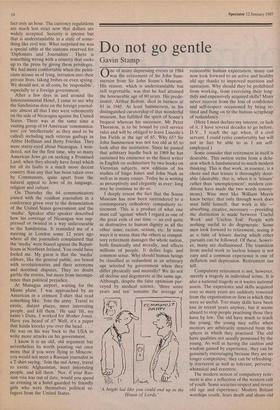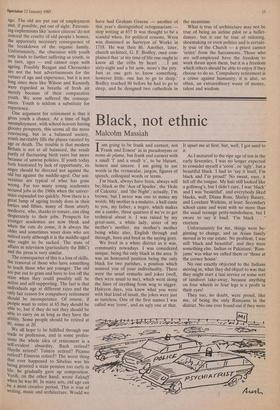Do not go gentle
Gavin Stamp
One of many depressing events in 1984 was the 'retirement of Sir John Sum- merson from Sir John Soane's Museum. His reason, which is understandable but still regrettable, was that he had attained the honourable age of 80 years. His prede- cessor, Arthur Bolton, died in harness at 81 in 1945. At least Summerson, in his distinguished curatorship of that wonderful museum, has fulfilled the spirit of Soane's bequest whereas his successor, Mr Peter Thornton, is to be bound by civil service rules and will be obliged to leave Lincoln's Inn Fields at the age of 65. Why 65? Sir John Summerson was not too old at 65 to look after the institution. Since he passed that arbitrary hurdle back in 1969 he has sustained his eminence as the finest writer in English on architecture by two books on Victorian subjects, new editions of his studies of Inigo Jones and John Nash as well/as in many essays. Today he is writing as perceptively and elegantly as ever: long may he continue to do so.
I deeply resent the fact that the Soane Museum has now been surrendered to a contemporary orthodoxy: compulsory re- tirement. This is a product of what one must call 'ageism' which I regard as one of the great evils of our time — an evil quite as destructive to human dignity as all the other -isms; racism, sexism, etc. In some ways it is worse than the others as compul- sory retirement damages the whole nation, both financially and morally, and affects millions of people. It defies logic and common sense. Why should human beings be classified as redundant at an arbitrary age selected by government when they differ physically and mentally? We do not all decline and degenerate at the same age. Although, despite the false optimism pur- veyed by medical science, 'three score years and ten' remains the average of 'A bright lad like you could end up in the House of Lords.' reasonable human expectation, many can now look forward to an active and healthy old age thanks to improved nutrition and sanitation. Why should they be prohibited from working, from exercising their leng- thily and expensively acquired skills? Many never recover from the loss of confidence and self-respect occasioned by being re- tired and flung on to the human scrapheap of redundancy.
(Here I must declare my interest, or lack of it. I have several decades to go before, D.V., I reach the age when, if a civil servant, I could retire comfortably but will not in fact be able to as I am self- em ployed . ) Some consider that retirement in itself is desirable. This notion stems from a delu- sion which is fundamental to much modern thinking. This is that work, in essence, is a chore and that leisure is thoroughly desir- able (desirable, that is, when it is 'leisure' rather than 'unemployment': modern con- ditions have made the two words synony- mous). Wise men like William Morris knew better: that only through work does man fulfil himself, that work is life — absorbing, creative, necessary — providing the distinction is made' between 'Useful Work' and 'Useless Toil'. People with nothing useful to do degeRerate. Some men look forward to retirement, seeing it as a time of leisure during which other pursuits can be followed. Of these, howev- er, many are disillusioned. The transition from useful work to Useless leisure is not easy and a common experience is one of deflation and depression. Retirement can kill.
Compulsory retirement is not, however, merely a tragedy in individual terms. It is also a national tragedy as it wastes national assets. The experience and skills acquired over so many years are suddenly removed from the organisation or firm in which they were so useful. Too many skills have been lost in recent years anyway, but it seems absurd to stop people practising those they have by law. The old have much to teach the young; the young may suffer when mentors are arbitrarily removed from the sphere in which they practised. The old have qualities not usually possessed by the young. As well as having the caution and wisdom gained by experience, they can be genuinely encouraging because they are no longer competitive; they can be refreshing- ly irreverent as well as tolerant, perverse, whimsical and eccentric.
The modern notion of compulsory retir- ment is also a reflection of the western cult of youth. Some societies respect and revere old age and ekperience. Modern Britain worships youth, fears death and shuns old age. The old are put out of employment and, if possible, put out of sight. Patronis- ing euphemisms like 'senior citizens' do not conceal the cruelty of old people's homes, the apparently necessary consequence of the breakdown of the organic family. Unfortunately, the obsession with youth only leads to further suffering as youth, in its turn, ages — and cannot cope with ageing. Possibly Reagan and Chernenko are not the best advertisements for the virtues of age and experience, but it is not long since men like Wilson and Kennedy were regarded as breaths of fresh air merely because of their comparative Youth. We soon suffered the consequ- ences. Youth is seldom a substitute for experience.
One argument for retirement is that it gives youth a chance. At a time of high unemployment, with school-leavers having gloomy prospects, this seems all the more convincing, but in a balanced society, Youth inevitably fills the places vacated by age or death. The trouble is that modern Britain is not at all balanced, the result partly of fluctuating birth rates but more because of unwise policies. If youth today feels frustrated by lack of opportunity, its anger should be directed not against the old but against the middle-aged. Our uni- versities are typical of what has gone wrong. Far too many young academics secured jobs in the 1960s when the univer- sities expanded too quickly. Now there is a great lump of ageing trendy dons in their forties and fifties, many of them utterly mediocre, who, thanks to tenure, can cling desperately to their jobs. Prospects for Younger academics are now bleak and When the cuts do come, it is always the Older and sometimes wiser dons who are retired early although it is the middle-aged Who ought to be sacked. The state of affairs in television (particularly the BBC) and the press is very similar.
The consequence of this is a loss of skills, the removal of those who have something to teach those who are younger. The old are put out to grass and have to live off the state when they could possibly still be active and self-supporting. The fact is that individuals age at different rates and the only fair reason for compulsory retirement Should be incompetence. Of course, if People want to retire at 65 they should be able to, but if they do not they should be able to carry on as long as they have the ability. Some people should be retired at 80, some at 20.
We all hope to be fulfilled through our trade or profession, and in some profes- sions the whole idea of retirement is a self-evident absurdity. Bach retired? Haydn retired? Tolstoy retired? Picasso retired? Einstein retired? The worst thing that ever happened to Sibelius was his being granted a state pension too early in life: he gradually gave up composition. Verdi, on the other hand, wrote Falstaff When he was 80. In many arts, old age can be a most creative period. This is true of writing, music and architecture. Would we have had Graham Greene — another of this year's distinguished octogenarians — stop writing at 65? It was thought to be a scandal when, for political reasons, Wren was dismissed as Surveyor of Works in 1718. He was then 86. Another, later, church architect, G. F. Bodley, once com- plained that 'at my time of life one ought to know all the cribs by heart . . . I am• sixty-eight and a bit now, more's the pity. Just as one gets to know something, however little, one has to go to sleep.' Bodley reached 80 before he had to go to sleep, and he designed two cathedrals in the meantime.
What is true of architecture may not be true of being an airline pilot or a ballet- dancer, but it can be true of tailoring, shoemaking or even politics and is certain- ly true of the Church — a priest cannot 'retire' from the Sacraments. Those who are self-employed have the freedom to work thrust upon them, but it is a freedom which others should be able to enjoy if they choose to do so. Compulsory retirement is a crime against humanity; it is also, so often, an extraordinary waste of money, talent and wisdom.







































 Previous page
Previous page